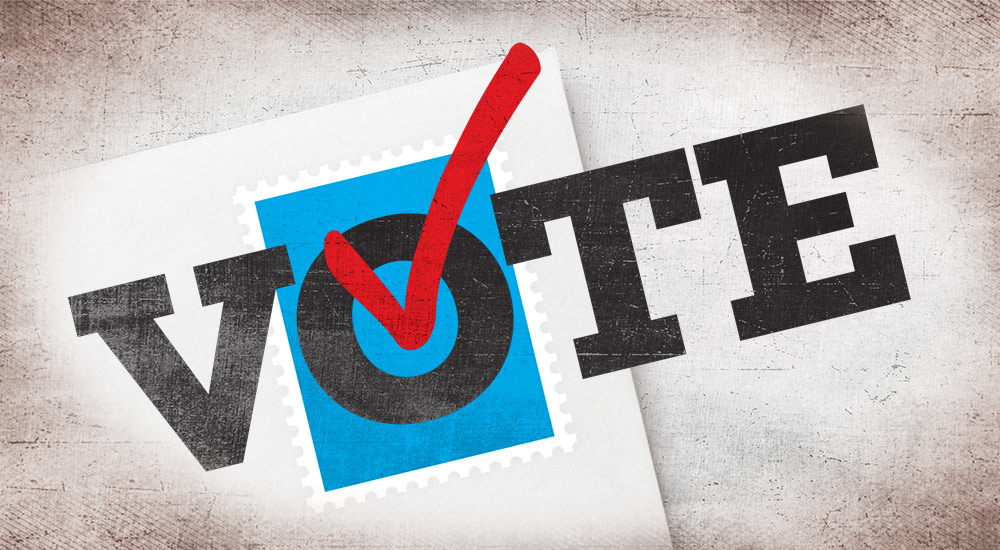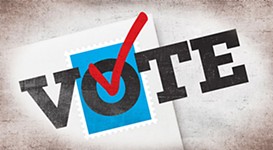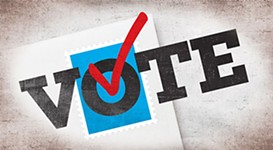Will Vote-by-Mail Happen by July?
Legal battle clouds election planning timeline
By Michael King, 11:30AM, Thu. Apr. 23, 2020
Travis County Clerk Dana DeBeauvoir says she needs to know by May 1 whether all local voters will be allowed to vote by mail. On Friday, a state district court said yes – but Attorney General Ken Paxton says he’ll appeal. Will the courts provide a resolution by May?
On Friday, April 17, Judge Tim Sulak of the 353rd state District Court ruled that in the context of the COVID-19 pandemic, all Texas voters are eligible to apply for mail ballots under the “disability” provision of state election law. The same day, A.G. Paxton filed notice that he would appeal Sulak’s ruling to the Third Court of Appeals. That’s where matters stand now – with the legal battle pending and the election planning clock ticking in the background.
DeBeauvoir is hardly the only election official needing state or judicial guidance in order to plan for the July 14 primary run-offs. As Texas Democratic Party election coordinator Glen Maxey testified in the April 15 hearing, election administrators in the 254 Texas counties need to know how best to prepare for whatever voting system the state and the courts allow. In response to a vote-by-mail petition organized by advocacy group Progress Texas, Secretary of State Ruth Hughs cited current election law – defining “disability” as a condition that could risk a voter’s health, adding, “If a voter believes they meet this definition, they can submit an application for ballot by mail.”
Hughs suggested there might be future “guidance,” but effectively left hundreds of officials wondering how best to provide a voting process that is both efficient for voting and safe for both voters and election workers. Unless the courts act soon, there are likely to be different procedures all over the state, casting doubt on the reliability and equity of the outcomes.
Although DeBeauvoir was the named defendant in the state lawsuit (a federal suit is also pending), her own election planning is dependent on the outcome. Without firmer official guidance, she told the Chronicle, she is planning (and budgeting) for three potential procedures: 1) business as usual; 2) universal vote-by-mail; 3) a hybrid election that would be predominately vote-by-mail but include some in-person voting (especially if some voters insist upon it). But even “business as usual” is likely in practice to be dramatically different: election workers will be hard to recruit and difficult to protect, and however the courts eventually rule, there is likely to be a surge in voting by mail, meaning different preparations and different needs for resources and staffing.
Those implications were apparent in the April 15 hearing, during which medical experts testified that they expect pandemic conditions to persist throughout the summer months and into the fall. Under current state law, absentee voters, voters 65 or older, and those with a “disability” that prevents them from in-person voting are eligible to vote by mail ballot – and lawyers for the TDP argued that the decision on what constitutes a “disability” is effectively left to the individual voter, not county officials. Maxey said party chairs (responsible for primaries) and county clerks have been given no state guidance on how to proceed, and they expect that no more than 20% of regular election workers (often elderly) will be willing to staff polls under pandemic conditions. (DeBeauvoir said that even for March 3 primary contests, many scheduled workers simply stayed home without notifying administrators, creating a scramble to cover the polls.)
Maxey cited the debacle of the recent Wisconsin election, and said, “In my opinion, waiting until July 14 to prepare would be the same as knowing there’s a hurricane coming but waiting for it to hit.” Neither officials nor voters will know how to proceed, he said, resulting in “a muddled mess … that will be untenable.”
Two medical experts – epidemiologist Dr. Catherine Troisi and geriatrician Dr. Mitchell Carroll – provided the most sobering testimony concerning the likelihood of the continuing risk of the coronavirus and its medical effects. Troisi recounted the history of the pandemic and its likely future progress: she described it as extremely infectious and likely to remain so through the summer and the rest of the year. She said that until there are more effective treatments, the most effective response remains the social distancing now prescribed throughout the country.
“Nobody is immune,” Troisi said, “everyone is at risk of being infected.” She noted that two out of five hospitalized patients are between 20 and 44 years old, and that the coronavirus “hijacks the respiratory cells to replicate.” That means major precautions are likely to be necessary for months, and that potential vaccines are years away: “The fastest vaccine on record took four years.”
Asked to provide a more precise timeline, Troisi said that without more infection testing than is currently available nationwide, it’s impossible to say. Asked by Asst. A.G. Michael Abrams (representing the state) if she thought the risk could be made manageable at the polls (akin to current practices in grocery stores), Troisi said no, because of the inability to maintain distancing within poll stations and the hours-long risk to poll workers. “We need a national standard, not just a state standard,” she said, and added that voting by mail creates little or no risk of infection.
Dr. Carroll spoke more specifically of his elderly patients, who are at direct and serious risk. He treats as many as possible via telemedicine, but that’s not always possible and he protects in-office patients and himself with personal protective equipment. “But that can’t be worn for more than a few minutes at a time – you start to sweat and your glasses fog up.” It would not be reasonably feasible for election workers.
Abrams questioned whether Carroll had sufficient direct experience of Covid-19 to offer an expert opinion. “One of my patients died of Covid-19 this morning,” the doctor answered, and he continued to care for the man’s spouse.
Overall, the state’s defense, presented by Abrams and fellow assistant A.G. Anna Mackin, was remarkably thin. They argued that the courts have no jurisdiction over legislative matters (a notion, TDP attorney Chad Dunn pointed out, that would eviscerate the judicial system as a co-equal branch of government), that pandemic conditions might change by July, or that Gov. Greg Abbott might provide additional direction to protect voters and the public. They suggested that the judgments of the medical experts were only “speculation,” and officials could wait until July to take action – ignoring the advance planning necessary and creating a “too soon now, too late then” dilemma for election officials.
Judge Sulak was unpersuaded, and as the hearing concluded, his main uncertainty appeared to be what length to assign a temporary injunction. He told the court – remotely, as the entire hearing proceeded amidst a Zoom gallery of lawyers – that he was inclined to rule in favor of the plaintiffs: the Texas Democratic Party, and the plaintiff intervenors (the League of Women Voters, Move Texas Action Fund, and the Workers Defense Action Fund). Two days later, April 17, he settled on July 27 as an injunction end date, when (barring appeals) the parties will reconvene and consider next steps.
During the April 15 hearing, the judge had asked Troisi for her expectations of conditions in November; she said she expects the pandemic risk to public health to remain “very, very high.”
Nevertheless, even as the hearing was concluding, A.G. Paxton had fired his own shot, releasing an advisory letter to state Rep. Stephanie Klick threatening prosecution of any voter who voted by mail without a narrowly defined “physical condition” constituting a “disability.” Paxton threatened “criminal sanctions” as well for any election official advising such a vote. “Fear of contracting Covid-19,” wrote Paxton, does not constitute a disability, as he defines it.
It remains to be seen whether the appeals courts will concur – and more urgently, whether they will rule quickly enough to make an effective difference for election officials and voters.
Got something to say? The Chronicle welcomes opinion pieces on any topic from the community. Submit yours now at austinchronicle.com/opinion.
A note to readers: Bold and uncensored, The Austin Chronicle has been Austin’s independent news source for over 40 years, expressing the community’s political and environmental concerns and supporting its active cultural scene. Now more than ever, we need your support to continue supplying Austin with independent, free press. If real news is important to you, please consider making a donation of $5, $10 or whatever you can afford, to help keep our journalism on stands.
Michael King, April 17, 2020
Michael King, April 15, 2020
Michael King, June 26, 2020
Michael King, June 16, 2020
Sept. 2, 2022
353rd District Court, Vote-by-Mail, Dana DeBeauvoir, Ken Paxton, Tim Sulak, Texas Democratic Party, July 2020 Elections













